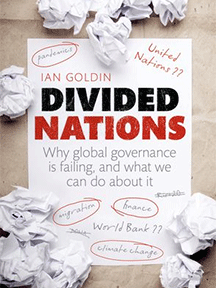By Fred H. Lawson
Severe problems of all sorts confront the contemporary world. The global recession of 2008-2009 damaged institutions and livelihoods from New York and London to Kerala and Nairobi. The swine flu of 2009 represents only a taste of the destructiveness that may accompany the outbreak of future pandemics. The jump in computerized flows of information and economic transactions opens up unprecedented possibilities for criminal activity and sabotage. And the ongoing transformation of the world’s climate threatens the physical survival of countries like Bangladesh and the Maldives in the near term and that of a majority of the Earth’s population in the long run.
None of these problems, Ian Goldin argues, can be solved by nation-states acting on their own. Not only do the causes of such difficulties transcend national boundaries, but the likelihood that independent, sovereign governments will agree to collaborate with one another in order to address collective dangers is vanishingly small. The most pressing global problems share the key characteristics of public goods: All countries will benefit if they get solved, so no country has an incentive to pay the cost of solving them. This makes it imperative for supranational institutions to do the heavy lifting.
Unfortunately, Goldin demonstrates that existing international organizations are either designed in such a way as to protect the prerogatives of sovereign states or operate too narrowly and too slowly to be able to handle the most important difficulties that plague the contemporary world. A very few, functionally oriented agencies manage to meet present dangers and adapt effectively as new challenges arise. The International Civil Aviation Authority and World Health Organization supervise air travel and public health remarkably well, while the European Union is credited with mitigating a wide range of political, economic and social problems among its fortunate member-states. Most other international institutions, however, have turned out to be disappointing or stillborn. Goldin singles the United Nations out for particularly harsh criticism, perhaps as a result of his long personal experience working on the inside of that particular path-breaking experiment in global governance.
What, to paraphrase Lenin, is to be done? Feasible solutions will have to take into account the fact that states remain the most powerful and legitimate political structures in the contemporary international arena. Goldin is no idealist, and recognizes that unless innovative institutions and practices of world governance accord a primary role to national authorities, they will most likely fail. States might be convinced to contribute greater resources and effort to resolving collective problems under certain conditions. First, not all countries should be included in deliberations and policy-making regarding all matters. It would be much more effective to assign specific problems to a small group of states, each of which has a strong and direct interest in the issue at hand. Second, it would be much easier to get co-operation with regard to big, complex problems if they were broken up into smaller components that can be addressed sequentially. Third, global problems should be handed over to “transgovernmental,” “professional” networks. “In contrast to voluntary targets established by the United Nations or the Bretton Woods institutions [i.e., the World Bank and International Monetary Fund],” Goldin asserts, “when these targets are established through consensus amongst professionals in transgovernmental networks, they tend to be pursued with a commitment which would be difficult to achieve if they were simply handed down from a government ministry.”
These arguments will sound familiar to students of international politics. Scholars who explore the dynamics of interstate co-operation emphasize the importance of limiting the number of actors that are involved in any given negotiation, as well as the benefits that come from dividing complex disputes into smaller parts. Early observers of regional integration in western Europe insisted that low-level, “functional” collaboration among technical specialists could be expected to lay the foundation for higher-level, political unification. This perspective, which goes by the name “neofunctionalism,” fell out of fashion as European integration waned during the 1960s, but has come roaring back after the consolidation of the European Union and the adoption of the euro.
Scholars of international relations may well quibble about two other things, which may look minor but point to deeper conceptual controversies. Throughout most of the book, Goldin rightly emphasizes the growing interconnectedness of global political, economic, social and environmental affairs. But on several occasions he deploys the tricky term “interdependence” as a synonym for “hyper-connectivity.” These two concepts are not equivalent, although they are probably intimately related. If two states are interdependent, then either they rely on each other for goods or services that are hard to obtain elsewhere or they would be equally damaged if the connection between them were severed. Goldin makes a compelling case that the high degree of interconnectivity in the contemporary world has made existing international institutions obsolete. He would have to make other arguments and provide different kinds of evidence to demonstrate that the United Nations, World Bank or Group of Seven industrial countries have grown toothless due to an increase in international interdependence.
Second, the book culminates in a series of excurses on the need to improve the effectiveness of governance in the international arena. Yet the crucial question continues to be “effective for whom”? Like it or not, states still find it to be in their strategic interest to ignore the dictates of the Kyoto Protocol on environmental policy and the provisions of the Doha Round regarding intellectual property rights. In this basic sense, global governance is proceeding very effectively indeed. Analysts who build into the notion of governance a hidden presumption in favor of activities that promote the common good, or what Rousseau calls the General Will, offer a skewed vision that, while it may be laudable and even desirable, downplays or ignores the hard realities of political life.
Fred H. Lawson (ΦBK, Indiana University, 1973) is the Lynn T. White, Jr. Professor of Government at Mills College and a resident member of the Zeta of California Chapter of Phi Beta Kappa.




